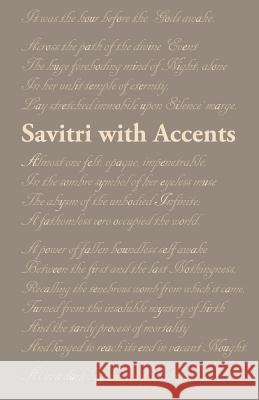Savitri with Accents » książka
Savitri with Accents
ISBN-13: 9781482706666 / Angielski / Miękka / 2013 / 824 str.
We present here the text of the First Edition of Savitri with accent-marks which are indicated with the font underlined. The metrical scansion of the lines is however left to the individual's perception. But we should also mention that we are not considering half or partial accents which on occasions can fall on vowels in the rhythmic flow of the theme. It must be further noted that some accents and stresses could change from context to context, and from person to person. However, the important consideration has to be articulation based on clear units of rhythm. Subjective element in the dynamics of words must be recognised while reading or reciting poetry, principally the poetry of the mystic-spiritual kind where the reserves of inner sound and silence count most significantly. It is towards the fulfilment of such an objective that Savitri with Accents is being submitted. Savitri Foundation feels privileged to put in a pioneering effort in that direction and present Sri Aurobindo's epic Savitri keeping in view its metrical aspect. It is hoped that this will prove helpful not only in reading it with the intended sense and communication or diction but also in its understanding by entering into the spirit of its utterance. *** The Tale of Satyavan and Savitri The tale of Satyavan and Savitri is recited in the Mahabharata as a story of conjugal love conquering death. But this legend is, as shown by many features of the human tale, one of the many symbolic myths of the Vedic cycle. Satyavan is the soul carrying the divine truth of being within itself but descended into the grip of death and ignorance; Savitri is the Divine Word, daughter of the Sun, goddess of the supreme Truth who comes down and is born to save; Aswapati, the Lord of the Horse, her human father, is the Lord of Tapasya, the concentrated energy of spiritual endeavour that helps us to rise from the mortal to the immortal planes; Dyumatsena, Lord of the Shining Hosts, father of Satyavan, is the Divine Mind here fallen blind, losing its celestial kingdom of vision, and through that loss its kingdom of glory. Still this is not a mere allegory, the characters are not personified qualities, but incarnations or emanations of living and conscious Forces with whom we can enter into concrete touch and they take human bodies in order to help man and show him the way from his mortal state to a divine consciousness and immortal life.
Zawartość książki może nie spełniać oczekiwań – reklamacje nie obejmują treści, która mogła nie być redakcyjnie ani merytorycznie opracowana.











